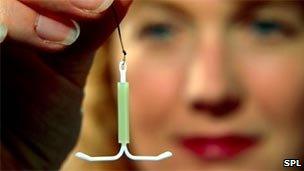Contraceptive coil raises hope of delaying womb cancer
- Published

The device sits in the womb where it can deliver the hormone treatment
European experts are hopeful that the coil contraceptive device could be used to delay womb cancer.
Promising early trial findings show an intrauterine device (IUD) can deliver hormones to the womb lining to halt and even reverse cancer growth.
This can buy young women with the disease time to have children before undergoing a curative hysterectomy.
It has already enabled nine such women to conceive, Annals of Oncology journal reports.
The usual treatment for endometrial cancer is a total hysterectomy with the removal of the womb and ovaries, but this results in the end of the woman's fertility.
Preserving fertility
Sometimes it is possible for patients to be given oral hormone therapy to slow down the growth of the cancer, but this can cause unpleasant side effects, including skin rashes, nausea and vomiting.
Delivering the hormones direct to the problem area with a coil can avoid some of these side effects.
In this first prospective clinical trial of the treatment, 39 women aged between 20 and 40 and with very early womb cancer were studied.
Each of the woman was fitted with an IUD that released a steady stream of a progesterone-like hormone aimed at halting the cancer growth.
The women also received a monthly injection of gonadotropin-releasing hormone for six months to stop them producing oestrogen - the hormone that promotes the development of endometrial cancer.
The IUD was left in place for a year, and then, if the cancer had not continued to grow or returned, it was removed, enabling the women to plan for pregnancies.
Once the women had completed their desired number of pregnancies, they had hysterectomies.
All of the women are alive and well and so far nine have succeeded in having a baby.
Dr Lucas Minig, one of the authors of the study conducted at the European Institute of Oncology in Milan, said the findings gave encouragement for starting a larger international trial of the treatment.
Henry Scowcroft of Cancer Research UK said there were more hurdles to overcome before it could be recommended as a treatment for women with womb cancer.
"We look forward to seeing the results of larger more robust trials," he said.
The charity has been funding its own studies, external into this type of treatment.
Meanwhile, its latest research in the British Journal of Cancer suggests women who exercise and keep active can cut their risk of womb cancer by almost a third.